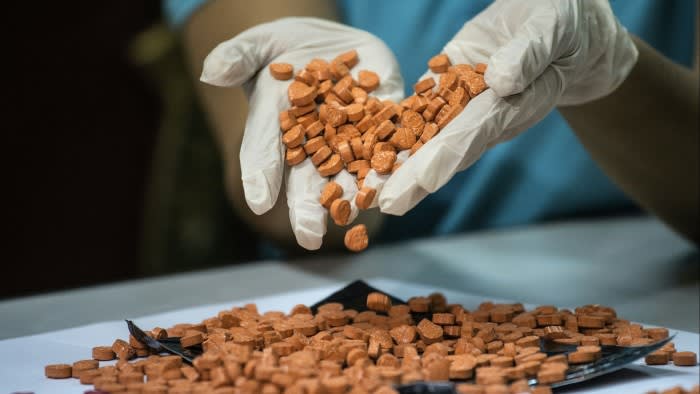Stay informed with free updates
Simply log in to the Pharmaceutical sector myFT Digest – delivered straight to your inbox.
A panel of experts convened by the US Food and Drug Administration has voted decisively against the use of MDMA, better known as party drug ecstasy, as a treatment for post-traumatic stress disorder.
Tuesday’s ruling was a major setback for Lykos Therapeutics, the biotech developing the treatment, and the emerging psychedelics sector, which has received hundreds of millions of dollars in investment in recent years.
After a nine-hour evidence session, the FDA advisory committee, made up of mental health and medical experts, voted by a 9-2 margin that the available data did not prove the drug was an effective treatment for PTSD when combined with therapy. In a second vote, the panel also concluded that the benefits of the treatment did not outweigh the risks, passing by a vote of 10 to 1.
The FDA is expected to make a final decision by mid-August. The panel’s vote is non-binding but typically has significant influence on the agency and will therefore dramatically reduce the chances of the treatment being approved, dashing the hopes of psychedelics advocates and investors.
Amy Emerson, CEO of Lykos, said in a statement: “We are disappointed with today’s vote given the urgent unmet need in the field of PTSD and appreciate that the committee faced a challenging and atypical assignment, evaluating a therapeutic approach that combines drug therapy (MDMA) and psychological intervention.”
If approved, Lykos’ MDMA-based therapy treatment would have become the first new PTSD treatment in more than two decades. It would also have been the first time that a Schedule 1 drug, which the government considers has no medical use and a high potential for abuse, would have been approved as a regulated mental health treatment.
Earlier this year, Lykos — which emerged from the Multidisciplinary Association of Psychedelic Studies, a nonprofit organization — raised $100 million from a group of 10 investors, including the charitable foundation run by hedge fund billionaire Steven Cohen and his wife Alexandra.
In the second of two Phase 3 trials, the Lykos treatment showed that 71 percent of people who received the MDMA-based therapy improved enough to no longer meet criteria for PTSD diagnosis, compared to 48 percent in the placebo group. Patients received the drug over three eight-hour therapy sessions.
But the FDA panel was not convinced and voted against endorsing the treatment’s effectiveness, citing problems with the trial design and data collection.
Rajesh Narendran, a professor of radiology and psychiatry at the University of Pittsburgh School of Medicine and chairman of the panel, said problems with the trial design made the data “meaningless.”
“Over there [were] just too many problems with it [the study]” added Satish Iyengar, professor of statistics at the University of Pittsburgh.
Tiffany Farchione, an FDA official, previously told the panel that Lykos had failed to collect data on the drug’s abuse-related side effects, which the company had considered positive, such as “euphoria” or “elevated mood ‘, meaning it may be difficult to label the drug accurately. Farchione said the data collection issues “arguably have the biggest impact” on the agency’s decision.
David Millis, a clinical reviewer for the FDA, also raised concerns about “double-blind” trial participants due to MDMA’s powerful hallucinogenic effects. “Although we have two positive studies, the results are in the context” of participants who knew they were taking the drug, Millis said. Farchione also noted that the study did not adequately assess the effect of psychotherapy on treatment and the potential cardiological risks of treatment.
Alia Lilienstein, Lykos’ senior medical director, pushed back against the criticism during the evidence session. Before the hearing, two influential nonprofits — the Institute for Clinical and Economic Review and an offshoot of the American Psychological Association — had also criticized the Lykos treatment.
